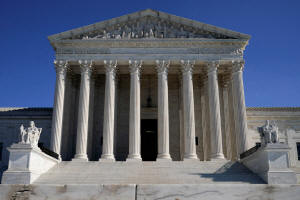U.S. Supreme Court rebuffs Republicans in electoral map disputes
 Send a link to a friend
Send a link to a friend
 [March 08, 2022]
By Andrew Chung and Lawrence Hurley [March 08, 2022]
By Andrew Chung and Lawrence Hurley
WASHINGTON (Reuters) -The U.S. Supreme
Court on Monday let North Carolina and Pennsylvania use electoral maps
approved by state courts to replace ones deemed to have given
Republicans unfair advantages, improving Democratic chances of retaining
control of the U.S. House of Representatives in November.
The justices denied Republican requests to put on hold lower court
rulings that adopted court-drawn boundaries for North Carolina's 14
House districts and Pennsylvania's 17 House districts to replace
electoral maps devised by Republican-controlled legislatures in the two
states.
Republicans are seeking to regain control of the House, narrowly
controlled by President Joe Biden's fellow Democrats, in the Nov. 8
midterm elections. Party primaries in Pennsylvania and North Carolina
are set for May 17.
The court has a 6-3 conservative majority. Conservative Justices Samuel
Alito, Clarence Thomas and Neil Gorsuch dissented from the action
concerning North Carolina.
The North Carolina and Pennsylvania disputes are among the numerous
court battles nationwide over the composition of electoral districts,
which are redrawn each decade to reflect population changes measured in
a national census, last taken in 2020.

In most states, such redistricting is done by the party in power, which
can lead to map manipulation for partisan gain. The Supreme Court in
2019 barred federal judges from curbing the practice, called partisan
gerrymandering.
LEGAL DOCTRINE
The cases touch upon a once-marginal legal theory called the
"independent state legislature doctrine" that is gaining traction in
conservative legal circles and, if accepted, would vastly increase the
power of politicians over elections. Under that doctrine, the U.S.
Constitution gives legislatures, not state courts or other entities,
authority over election rules including the drawing of electoral
districts.
The North Carolina Republican lawmakers challenging the court-drawn map
placed the theory front and center, writing in a court filing: "The
North Carolina courts have usurped (the legislature's) constitutional
authority."
Alito said the justices should have blocked the court-drawn map.
"This case presents an exceptionally important and recurring question of
constitutional law, namely, the extent of a state court's authority to
reject rules adopted by a state legislature for use in conducting
federal elections," Alito wrote.
The doctrine is based in part on language in the Constitution stating
that the "times, places and manner" of federal elections "shall be
prescribed in each State by the Legislature thereof."
[to top of second column]
|

The Supreme Court is seen In Washington, U.S., January 26, 2022.
REUTERS/Joshua Roberts/File Photo
 Conservative Justice Brett Kavanaugh
indicated sympathy toward the views of the dissenters but said it
was too close to the election to block the maps. But Kavanaugh added
that the court should take up the underlying legal issue in due
course.
The opinions by Kavanaugh and Alito indicated that the court has the
four votes needed to take up the doctrine and issue a ruling
potentially limiting state court authority to review federal
election rules set by state legislatures ahead of the 2024 U.S.
presidential election.
It remains unclear if a majority of the justices would embrace such
a ruling.
"Today's orders are temporary good news, but statements from four of
the justices are ominous for the ability of state courts to uphold
the right to vote under state constitutions," voting rights expert
Josh Douglas of the University of Kentucky Rosenberg College of Law,
wrote on Twitter.
Bob Phillips, executive director of Common Cause North Carolina, a
group defending the state's new districts, called Monday's action a
victory.
"We're pleased that the U.S. Supreme Court rejected the legislative
defendants' shameless attempt to impose their gerrymandered
congressional map upon North Carolina," Phillips said.
The North Carolina Supreme Court, acting after Democratic voters and
an environmental group challenged the Republican-drawn map, struck
it down, concluding it was intentionally biased against Democrats,
diluting their "fundamental right to equal voting power" in
violation of the state constitution's free elections and freedom of
assembly provisions, among others.
A lower state court then rejected a redrawn map submitted by the
legislature, instead adopting a new map drawn by a bipartisan group
of experts. According to some redistricting analysts, the
court-approved map includes seven districts likely to favor
Republicans, six likely to favor Democrats and one competitive seat.
In Pennsylvania, Democratic Governor Tom Wolf vetoed a map approved
by the legislature, saying the configuration of House districts gave
Republicans an unfair advantage.

The Pennsylvania Supreme Court, acting on a lawsuit filed by
Democratic voters, approved a new map that eliminated one
Republican-leaning district approved by the legislature and,
Republicans have argued, created a statewide map advantageous to
Democrats.
(Reporting by Andrew Chung in New York and Lawrence Hurley in
Washington; Editing by Will Dunham)
[© 2022 Thomson Reuters. All rights
reserved.] This material may not be published,
broadcast, rewritten or redistributed.
Thompson Reuters is solely responsible for this content. |